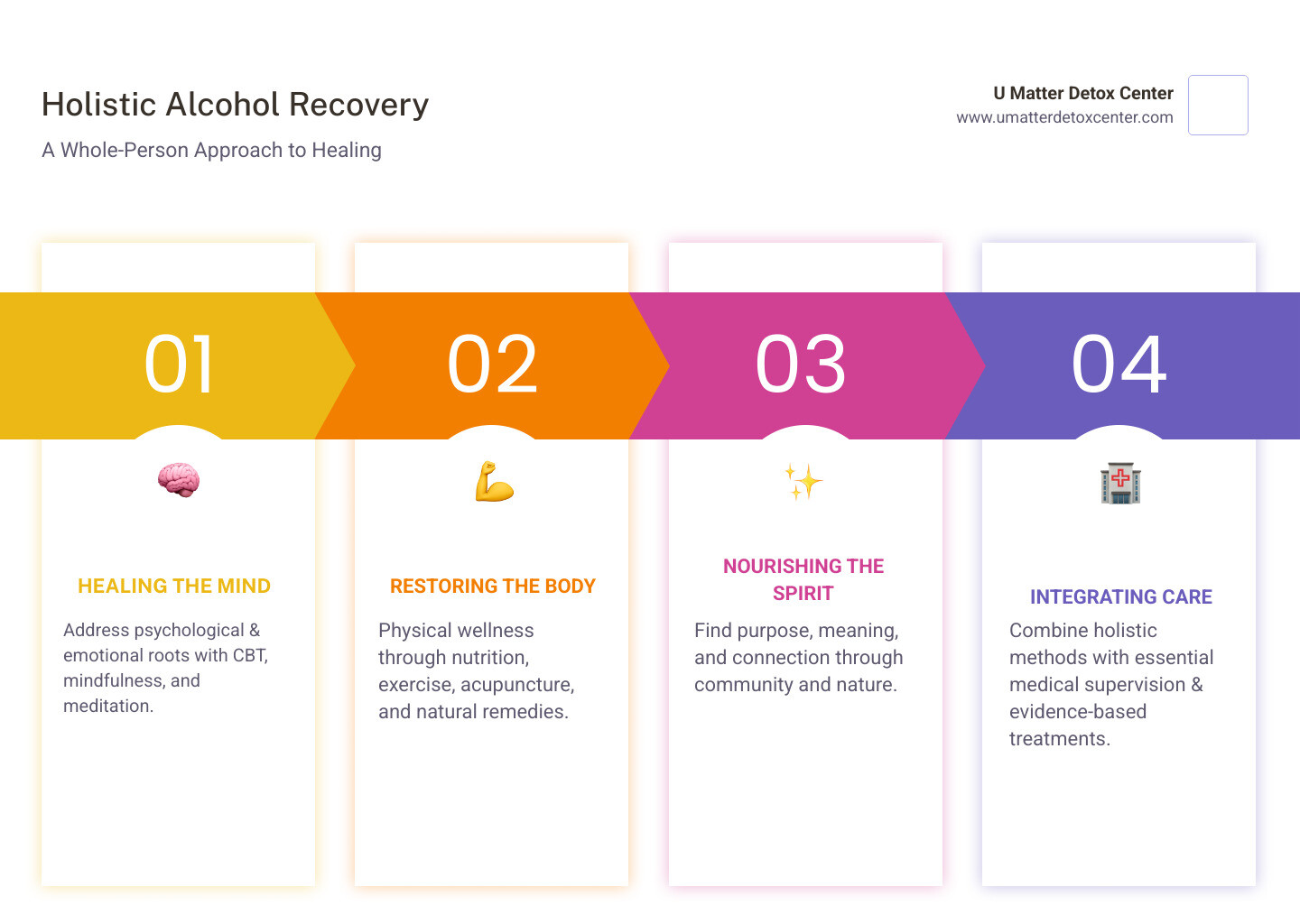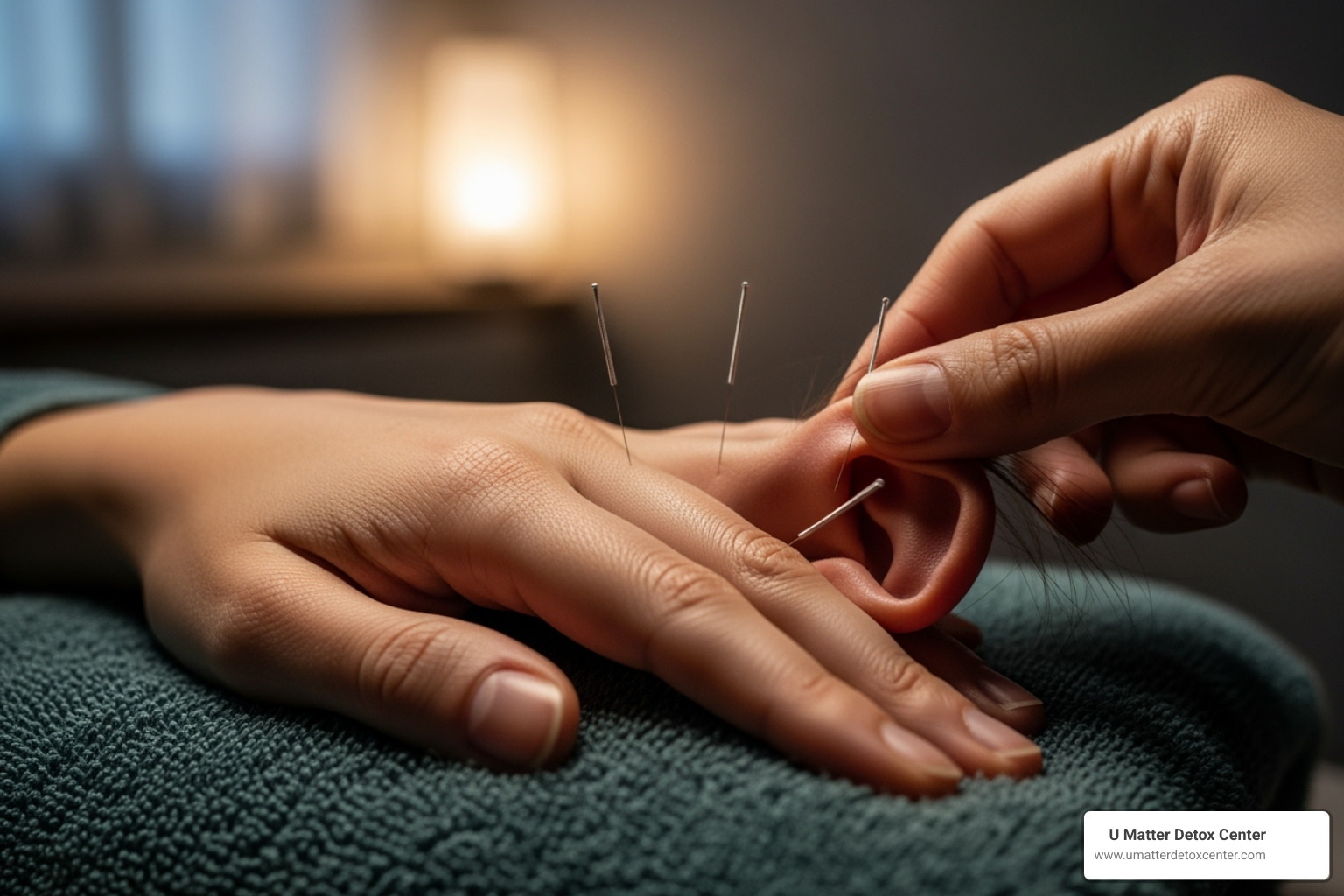Understanding the Whole-Person Approach to Recovery
Holistic treatment for alcoholism offers a comprehensive path to recovery that goes far beyond simply stopping drinking. This approach recognizes that addiction affects every aspect of a person's life - mind, body, and spirit - and healing requires addressing all these interconnected elements.
Key Components of Holistic Alcoholism Treatment:
- Mind: Meditation, mindfulness, cognitive behavioral therapy, stress management
- Body: Nutritional therapy, exercise, acupuncture, natural remedies, physical restoration
- Spirit: Finding purpose, community support, nature therapy, spiritual practices
- Integration: Combining holistic methods with medical detox and evidence-based treatments
For high-achieving professionals dealing with alcohol dependency, this whole-person approach offers something traditional treatment often misses: a focus on restoring balance rather than just managing symptoms. The core philosophy recognizes that people develop addictions to correct an imbalance within themselves, whether that's biochemical, emotional, or spiritual.
Research shows that holistic approaches work by helping individuals become aware of and take responsibility for their thoughts, feelings, and actions. Unlike conventional methods that may focus solely on the physical aspects of addiction, holistic treatment emphasizes the interconnectedness of mental, emotional, and physical health.
Important note: Holistic therapies should always complement, never replace, medical supervision - especially during detox when alcohol withdrawal can be dangerous or even life-threatening.
This integrated approach has shown particular promise for professionals seeking discreet, transformative recovery that addresses not just the addiction, but the underlying stress, burnout, and life imbalances that often fuel alcohol dependency.

Holistic treatment for alcoholism vocabulary:
What is Holistic Treatment for Alcoholism?
At its core, holistic treatment for alcoholism is about healing the entire person, not just the symptoms of alcohol use disorder (AUD). We understand that addiction is a complex condition, often stemming from deeper imbalances within an individual's mind, body, and spirit. This approach aims to address these fundamental reasons for addiction, promoting genuine, lasting recovery.
The philosophy behind holistic therapy sees addiction as an 'imbalance' within an individual. When one part of a person is out of balance or in distress, it profoundly affects their overall well-being. Our goal is to help individuals become aware of and take responsibility for their thoughts, feelings, and actions, restoring equilibrium. This comprehensive perspective is crucial because alcohol use disorder, which is a medical condition where a person struggles to control alcohol use despite negative consequences, impacts every facet of one's life. Understanding alcohol use disorder is the first step towards a comprehensive recovery plan.
Unlike traditional methods that might solely focus on the physical cessation of drinking, holistic treatment emphasizes the profound interconnectedness of mental, emotional, and physical health. It provides tools to repair and improve emotional, relational, physical, mental, spiritual, career, and even financial well-being. This all-encompassing strategy builds resilience, improves self-esteem, and significantly reduces the likelihood of relapse. For us, recovery extends far beyond mere abstinence; it's about fostering a healthier lifestyle and achieving total well-being.
The Core Components of Holistic Treatment for Alcoholism
To truly heal the whole person, we focus on distinct yet interconnected components: the mind, the body, and the spirit. Each plays a vital role in building a strong foundation for sobriety.
Healing the Mind: Psychological and Emotional Wellness
The mind is a powerful tool, and nurturing its health is paramount in overcoming alcohol use disorder. Chronic alcohol use changes how your brain works, impacting neurotransmitter balance and altering reward pathways. Our approach includes therapies designed to rebalance the mind and equip individuals with robust coping mechanisms.
- Mindfulness and Meditation: These practices are central to our approach. Studies have shown that mindfulness can significantly reduce symptoms of anxiety and depression, which are common among those struggling with addiction. Regular meditation helps manage cravings, reduce stress, and improve emotional regulation. Deep, slow breathing techniques, often part of meditation, calm the nervous system and manage agitation or panic. Mindfulness-based relapse prevention is a proven strategy that helps individuals become more aware of triggers and develop healthier responses.
- Stress Reduction Techniques: Beyond formal meditation, we incorporate various stress-reduction strategies, recognizing that stress is a major trigger for alcohol use.
- Cognitive Behavioral Therapy (CBT): This evidence-based therapy is highly effective for AUD. CBT helps individuals identify and change negative thought patterns and behaviors contributing to their alcohol use.
- Art and Music Therapy: These expressive therapies provide non-verbal avenues for self-expression and emotional exploration. Art therapy, for instance, has been used in addiction treatment since the 1940s, allowing individuals to process complex emotions and experiences.
- Virtual Therapy: We also offer virtual therapy options, including CBT, family counseling, and motivational improvement therapy, providing flexible and accessible support.
For more on mental wellness in recovery, explore our guide on Zen And The Art Of Mental Maintenance Holistic Retreats Explained.
Healing the Body: Physical Restoration and Natural Remedies
Alcohol abuse takes a significant toll on the body, depleting essential nutrients and damaging organs. Physical restoration is a critical step in holistic treatment for alcoholism, helping the body heal and regain strength.

- Nutritional Therapy: This is fundamental. Chronic alcohol consumption often leads to a general depletion of essential nutrients, vitamins, and minerals, particularly B vitamins (like thiamine), magnesium, and electrolytes. Our programs emphasize nutrient-dense meals rich in leafy greens, lean protein, whole grains, and healthy fats. We aim to repair the body's systems, support brain chemistry, and restore overall vitality. Specific supplements like L-Glutamine, Vitamin C (which can help neutralize toxic breakdown products of alcohol), and a high-potency multi-vitamin/mineral supplement are often recommended under professional guidance to address these deficiencies and aid healing.
- Exercise and Physical Activity: Regular exercise is a powerful tool. It improves mood, relieves stress, boosts endorphins (our body's natural "feel-good" chemicals), and strengthens the body. Activities like walking, strength training, yoga, and Tai Chi are incorporated. Yoga helps remove tension, aids detoxification, and fosters self-awareness. Tai Chi, with its gentle movements, is believed by some to help eliminate toxins built up in the body's tissues.
- Acupuncture: This ancient practice is increasingly used in addiction treatment. While research on its efficacy for alcohol cravings and withdrawal has shown mixed results (some studies indicate a weak effect, while others found no significant difference compared to placebo), many individuals report benefits like reduced cravings, relaxation, and improved mental clarity. The theory is that it may help decrease dopamine levels, making alcohol less desirable. We use qualified practitioners who integrate this into a broader treatment plan. The National Acupuncture Detoxification Program is a well-known model for this.
To learn more about how we support the body's healing process, read about our Alternative Detox Methods That Actually Make Sense.
Healing the Spirit: Finding Purpose and Connection
The spiritual component of holistic treatment for alcoholism is not necessarily tied to religion, but rather to finding meaning, purpose, and connection. Addiction can leave individuals feeling lost, isolated, and without direction. Restoring spiritual health is about rebuilding hope and finding joy in life again.
- Finding Meaning and Purpose: We encourage clients to explore what truly motivates them and brings them a sense of fulfillment. This can involve identifying new passions, reconnecting with old hobbies, or finding a sense of contribution.
- Self-Efficacy and Empowerment: Building self-confidence and a belief in one's ability to maintain sobriety is crucial. This comes from achieving small victories, learning new coping skills, and understanding one's inherent strengths.
- Nature Therapy: Spending time in nature can be incredibly grounding and restorative. Interaction with animals and outdoor activities can reduce stress, promote mindfulness, and foster a sense of peace. Our locations in beautiful Southern California, including Malibu and Hidden Hills, offer ample opportunities for this.
- Prayer and Spiritual Practices: For those who find comfort in it, prayer or other spiritual practices can be a source of calm, balance, and connection to a higher power or universal energy.
-
Community Support: A sense of belonging and connection is vital for long-term recovery. We encourage participation in various support groups, which provide a safe space for sharing experiences, gaining perspective, and receiving encouragement. These include:
- Alcoholics Anonymous (AA): A widely recognized 12-step program that has benefited over two million people worldwide.
- SMART Recovery: A science-based program focused on self-empowerment and self-reliance.
- Secular Organizations for Sobriety (SOS): An alternative for those seeking a non-spiritual approach to recovery.
Common Holistic Therapies and Natural Aids
Beyond the core mind-body-spirit framework, various specific holistic therapies and natural remedies are often incorporated into a comprehensive holistic treatment for alcoholism plan.
Experiential and Body-Based Practices
These therapies help individuals reconnect with their bodies, process emotions, and develop new coping mechanisms.
- Massage Therapy: Massage helps individuals reconnect physically and center themselves emotionally. It can reduce stress hormones, improve circulation, and aid in the body's natural cleansing processes, helping to alleviate tension and promote relaxation.
- Animal-Assisted Therapy: Interacting with animals can provide emotional support, reduce feelings of loneliness and isolation, and promote a sense of responsibility and empathy. This can be particularly beneficial for those in early recovery.
- Horticulture Therapy: Engaging with plants and gardening can be therapeutic, offering a sense of purpose, reducing stress, and fostering connection with nature.
- Mindfulness Meditation: As mentioned earlier, mindfulness meditation helps individuals stay present, manage cravings, and regulate emotions. Research on the relative efficacy of mindfulness-based relapse prevention shows promising results in sustaining long-term sobriety.
To understand more about the full spectrum of therapies we offer, including these experiential practices, explore our guide on Holistic Rehab 101 Healing The Whole Person.
Nutritional and Herbal Support for Alcoholism
While nutritional therapy focuses on whole foods and essential nutrients, certain herbal supplements are also explored for their potential to support recovery. It's vital to remember that these should always be used with caution and under medical supervision.
| Herb/Supplement | Purported Benefits (Research) |
|---|---|
| Kudzu | May reduce alcohol consumption by making one feel intoxicated sooner, thus leading to less overall drinking. Some studies show reduced intake in heavy drinkers. |
We are deeply passionate about walking alongside our clients on their journey to healing and wholeness. Our comprehensive approach to holistic treatment for alcoholism is designed to address every aspect of your well-being, ensuring a recovery that is not only sustainable but also profoundly transformative. We invite you to explore our luxurious facilities in Southern California, including Encino, Sherman Oaks, and Beverly Hills, where we combine advanced non-invasive technologies with natural remedies for a deep, individualized detox experience, often covered by insurance.
We understand that recovery is a continuous journey of self-improvement, and we are here to provide the compassionate, expert support you deserve.
Explore our holistic detox program to start healing your mind, body, and spirit


